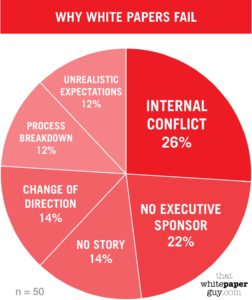6 reasons white papers fail: data and stories
Not every white paper that’s started ever gets finished.
In fact, my data shows 1 in 6 white papers fail.
At That White Paper Guy, I recently analyzed 300 of my white paper projects going back to 1997.
I was shocked to discover that 50 of these white papers—1 in 6—were abandoned and never published.
Another 36 of my white papers—1 in 9—were published with defects in editorial, design, or publishing that challenged their effectiveness.
Why do white papers fail?
As shown in the piechart, I found half a dozen reasons why some white papers don’t get completed:
- Internal conflict never resolved (26%)
- No executive sponsor (22%)
- No story, no research to back up claims (14%)
- Client changed direction, often due to product delays (14%)
- Process breakdown, often during reviews (12%)
- Unrealistic expectations (12%)
And boy, do I have some crazy stories to tell.

Mid-life crisis = No executive sponsor
This project started out normally enough: discussions were held, a deal was made, first invoice was delivered and paid.
We progressed through a plan, an outline, and a first couple of drafts. I got mixed feedback on anything I submitted.
I felt like I could never quite nail what the client wanted.
By the time I got to a third draft, his communications were getting sporadic. He would e-mail one day, then go silent for a few weeks.
Finally he just dropped off the map. After that, I never got any answers to my e-mails or phone messages.
I blamed myself for not delivering something the client could use.
Eventually I gave up chasing him to make it right.
My second invoice was never paid. My third milestone was never reached.
More than a year later, after I nudged him on LinkedIn, my ex-client very apologetically told me his story.
He’d had a mid-life crisis after his wife got pregnant.
He began drinking heavily and missing meetings, started an affair with the receptionist, and was eventually fired for dereliction of duty.
After that, his pregnant wife filed for divorce.
No one at his former company wanted to touch the draft white paper sitting in his Inbox, tainted by his misbehavior.
Eventually he fled to Europe and got another job in marketing. At his new company, he gave them my name as a writer.
When his new colleague contacted me about a project, I said, “No way! I don’t want anything to do with any company where he works.”
That was childish, but I was still sore.
And the funny thing is, this client wasn’t a stranger. I had happily worked with him earlier on numerous projects.

VP who couldn’t read = No story
An established company with an exciting new service for consumers hired me to write a white paper.
During our first call, the VP of Sales revealed that the market was huge: $31 billion a year!
Everyone was wowed. And I agreed to highlight that number in the paper.
I just needed the source. So he assured me he would send it to me.
But he didn’t.
During each followup call and in numerous e-mails, I asked the VP and his colleagues to dig out that source. They never did.
I completed a draft but we were still missing that all-important nugget about the market size.
Eventually I spent two hours Googling and scanning through a mountain of market research.
Finally, I came up with a promising report. At the end of it, I hit paydirt:
“Over the next five years, we foresee strong growth and this market reaching $31 million a year…”
Wait… $31 Million, not $31 Billion?! That’s a big difference.
I sent that report to everyone involved in the white paper.
“Is this the report you meant?” I asked. “But it only says $31 Million. Should we use that? Did some other source call it $31 Billion?”
The project stopped dead. No more calls. No more e-mails.
I had to chase them for months to get my second invoice paid. And the project never went any further.
Was that VP a sloppy reader?
Perhaps he had trouble with numbers: a strange flaw in a sales manager.
Or was it simply wishful thinking?
In any case, that white paper was never finished.

The husband-and-wife team = Internal conflict
At one award-winning small business, the husband did product development while the wife did marketing.
The husband liked to travel around the world promoting their latest software with a working prototype.
The wife thought they could reach more prospects by e-mailing around a white paper.
So she hired me to create one.
During our initial calls, the wife was attentive.
But the husband was always too busy to come on the call.
Not a biggie, I thought.
Next I submitted an outline. The wife liked it, but she couldn’t get the husband to look at it for weeks.
At one point, she told me they were going on a picnic, so she’d bring it out and make sure he looked at it. But he didn’t.
Hmmm… red flag. I didn’t want to proceed without the husband’s go-ahead.
But the wife paid my invoice and assured me we could move ahead.
So I wrote the full draft, and my go-to designer created some lovely graphics.
Again, the wife liked it. Again, the husband was missing in action.
After a couple of weeks, the wife said, “I’m going to bring this home and leave it on his pillow so that he HAS to read it tonight.”
Somehow he managed to brush it aside.
Still, the wife asked me to finish the design. And she paid my second invoice.
So I sent the text to my designer.
That paper turned out really well. It was a showcase, with strong features like these:
- Clear system diagram (they never had one)
- List of 6 key features (which I clarified)
- 10 advanced use cases (which they had never documented)
- 16 footnotes to credible sources (which I dug up)
I’m still proud of that white paper. It was one of the best I ever did.
Unfortunately, nobody else saw it. It was never published.
Eventually I submitted my final invoice, telling the wife that covered any final revisions for comments.
I never got any. She paid the final invoice, and that was it.

White papers can fail, even with established clients
Here’s a surprise: A writer can have a great working relationship with a client and develop several successful white papers together and then, out of the blue, the next paper can fail.
I’ve done 20 successful white papers with one client since 2006.
But over those years, two of our projects broke down and were never published.
In one case, the client had mixed feelings about a certain topic. He wanted to make some claims without tipping his hand to the competition.
So there was really nothing I could write up. (Category: no story).
In the other case, he tried an experiment and delegated the project to his new set of middle managers.
But they had no experience in content and couldn’t agree on any direction.
Over a few weeks, I proposed five Big Ideas in a row for the paper. Some liked every one, some hated every one. No one proposed any other approach.
One executive bristled when I suggested one of her points didn’t quite fit the context. She fired off 50 journal articles to back up her view.
I didn’t read them; the whole kerfuffle was about a minor side issue.
Then she suggested she was going to write her own white paper. Some day. When she got the time.
So even after I submitted a full draft, it was never published. That set of managers just didn’t know what they wanted. (Category: internal conflict.)
The happy ending?
After that fail, my original client the CEO and I managed to do another successful white paper together. It was like old times, smooth and easy.
Join me to create more successes
A wise colleague of mine calls white papers “high-risk, high-reward” projects. I think he’s right.
When these work out, they pay off big-time and everyone’s a hero.
When they don’t, they’re a colossal waste of effort, and everybody looks bad.
That’s why I’m continuing to research and propose practical tips on how to make sure your white papers succeed.
Whether you’re a B2B marketer or a white paper writer, you can get all my best tips and advice by subscribing to my regular newsletter. White Paper World.
Check out the back issues here.
Do you have a #whitepaperfail story to share? Tell us about it in the comments section below.
Want to hear whenever there’s a fresh article on this site? Subscribe here to stay in the know on long-form content. From time to time, we’ll also send you word about some great new resource or training. And you can unsubscribe any time.





Thank you so much for sharing these white paper failures, Gordon. While I felt your pain and frustration, there was also a part of me that thought: Wow, so these things can also happen to an expert like That White Paper Guy!
There are many lessons you can teach the participants of your mentorship course from this, but perhaps the first (and most important) is ‘get your 50% advance payment before you start working on that white paper.
Thank you, Helen. And since I wrote this, I’ve been shown many further sources that say similar things about project success rates in content marketing and many other areas of endeavor.